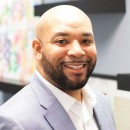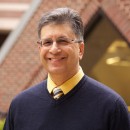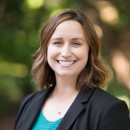School of Social Work News
Pages
 Katie Edward Discusses her Lawsuit Against the NIH on Science Friday
Katie Edward Discusses her Lawsuit Against the NIH on Science FridayProfessor Katie Edwards discussed her lawsuit against the National Institutes of Health (NIH) on the Science Friday podcast. Since January, the NIH has made sweeping cuts to research funding. “Initially, I was feeling so helpless and just like, this is the end of my career. This is the end of all the work we’ve done to prevent violence, improve youth outcomes. This is all ending. And then I got angry and then I said, I’m going to do something about this. And now, I’m suing the NIH,” she said.
- July 11, 2025
- Learn more »
- Rebeccah Sokol Writes Article for The Conversation About Teens’ Access to Firearms
Assistant Professor Rebeccah Sokol wrote an article in The Conversation about teens’ access to firearms at home.
“More than half of U.S. teens living in households with firearms believe they can access and load a firearm at home. Even when their parents report storing all firearms locked and unloaded, more than one-third of teens still believe they could access and load one,” wrote Sokol. “Prior research shows that teens who believe they can access a firearm are more likely to access and carry one. This is particularly concerning for teens who already have a higher risk for dying by suicide.” The article is based on her research which was published in JAMA’s Network Open.
- June 25, 2025
- Learn more »
 Rogério Pinto Quoted in Concentrate Media
Rogério Pinto Quoted in Concentrate MediaProfessor Rogério Pinto spoke with Concentrate Media as part of a story about Washtenaw County’s drag scene and using drag as activism. “Drag allows for creativity that is striking, provocative, and sometimes triggering, but allows for a level of humor that other things may not necessarily have,” Pinto said. “By using humor, drag makes me more vulnerable and allows me to convey an idea that could otherwise be very flat.”
- June 25, 2025
- Learn more »
 Andrew Grogan-Kaylor Writes Book on Multilevel Thinking
Andrew Grogan-Kaylor Writes Book on Multilevel ThinkingProfessor Andrew Grogan-Kaylor’s new book, “Multilevel Thinking: Discovering Variation, Universals, and Particulars in Cross-Cultural Research,” has been published by Oxford University Press. The book provides an introduction to multilevel modeling, which allows researchers to explore the variation and diversity across a data set.
- June 18, 2025
- Learn more »
 Announcing the Annmarie Hawkins Research Professorship in Disability Justice
Announcing the Annmarie Hawkins Research Professorship in Disability JusticeOn June 12, 2025, the Regents of the University of Michigan named Professor Connie Sung the inaugural Annmarie Hawkins Research Professor in Disability Justice. This esteemed position is made possible by a generous gift from Neil and Annmarie Hawkins to support research that advances the practice-based understanding of how to effectively support people with disabilities in living, working, and thriving in community settings. This term-of-years research professorship will enable Sung to dedicate time and resources to transformative research projects focused on community-based interventions that empower individuals with disabilities and enhance their quality of life.
“Annmarie Hawkins has been a true change agent for disability justice across four decades of service and impact – as a teacher of autistic students, vocational rehabilitation counselor, board member of multiple NGOs, an elected school board member for 16 years focused on special education, and as an appointed member of the board of Community Mental Health for Central Michigan. Her advocacy and service for people with disabilities has made a significant difference for thousands of people. This research professorship in her honor has real potential to extend her impact through the work of Dr. Sung and the University of Michigan,” said Neil Hawkins on behalf of the family.
Sung, who joined the School of Social Work in January 2025, will hold the Annmarie Hawkins Research Professorship in Disability Justice for up to five years. Sung’s research focuses on community-based interventions aimed at enhancing the career development of individuals with disabilities. Sung is a certified rehabilitation counselor, highly respected scholar and community-builder, and has authored over 100 publications and has secured over $20 million in research funding. She is also a Fellow of the American Psychological Association and a Mary Switzer Fellow awarded by the National Institute on Disability, Independent Living, and Rehabilitation Research. This research professorship will enable Sung to continue her transformational work in disability justice research and teaching at the nation's top-ranked School of Social Work. Sung looks forward to further bridging the gap between disability research and practice.
“My goal is to develop and implement evidence-based interventions that serve as actionable solutions to empower marginalized communities, foster equity and accessibility, and ignite a cultural shift toward greater inclusion and understanding of disability,” Sung said.
Prior to joining the School of Social Work, Sung served as the program director of the Master of Arts in Rehabilitation Counseling and co-director of the Michigan State University Center for Services, Training and Research for Independence and Desired Employment. She received her Master of Philosophy in Rehabilitation Sciences from The Hong Kong Polytechnic University and her PhD in Rehabilitation Psychology from the University of Wisconsin, Madison.
- June 18, 2025
 Sean de Four’s Op-Ed on Philanthropy Published in Bridge Michigan
Sean de Four’s Op-Ed on Philanthropy Published in Bridge MichiganLecturer Sean de Four’s op-ed “How Philanthropy Can Help Nonprofits Meet the Moment,” was published in Bridge Michigan.
“These are difficult times for nonprofit organizations, the foundations that support them and the broader philanthropic community. But the outpouring of concern and willingness to help is inspiring. We should harness this opportunity to not only respond to urgent needs that arise, but to also address some of the longstanding issues in our sector.”
- June 18, 2025
- Learn more »
 Robert Ortega Appointed to the Council on Social Work Education Board of Accreditation
Robert Ortega Appointed to the Council on Social Work Education Board of AccreditationAssociate Dean Robert Ortega has been appointed as a member of the Council on Social Work Education Board of Accreditation. Ortega will start his three-year term on July 1. The Board of Accreditation maintains and advocates for quality in social work education by overseeing the accreditation/candidacy process for more than 960 social work programs in the United States and its territories.
- June 13, 2025
 Brittani Parham Successfully Defends Dissertation
Brittani Parham Successfully Defends DissertationBrittani Parham, Joint Doctoral Program in Social Work and Psychology, has successfully defended her dissertation entitled "Compounded Disadvantage: Exploring the Intersection of Race, Sex, and Child Welfare in Juvenile Justice." Her committee included Matthew Smith (co-chair), Joseph Ryan and Camille Quinn. Parham is currently exploring job market opportunities in social work or juvenile justice policy.
- June 9, 2025
 So’Phelia Morrow Successfully Defends Dissertation
So’Phelia Morrow Successfully Defends DissertationSo’Phelia Morrow, Joint Doctoral Program in Social Work and Sociology, has successfully defended her dissertation entitled has successfully defended "Killing Us Softly: Intimate Partner Violence and The Forced Martyrdom of Black Women." Her committee included Terri Friedline (co-chair) and Rich Tolman. Morrow has accepted an assistant professor of social work position at Wayne State University.
- June 9, 2025

 Todd Herrenkohl, Katie Maguire-Jack and Rebeccah Sokol Write in The Conversation About Proposed Cuts to Vital Services
Todd Herrenkohl, Katie Maguire-Jack and Rebeccah Sokol Write in The Conversation About Proposed Cuts to Vital ServicesProfessor Todd Herrenkohl, Associate Professor Katie Maguire-Jack and Assistant Professor Rebeccah Sokol published an article in The Conversation on how the current proposed cuts to the 2026 federal budget would slash vital services to an array of programs that support low-income families and keep children fed, housed and safe.
“Our research has shown that increasing access to programs that support low-income families decreases child abuse and neglect while improving parents’ well-being,” they wrote. “We believe these programs are worth investing in because children’s lives are at stake. Especially when the economy appears to be in trouble, the consequences of weakening the safety net are dire.”
- May 29, 2025
- Learn more »